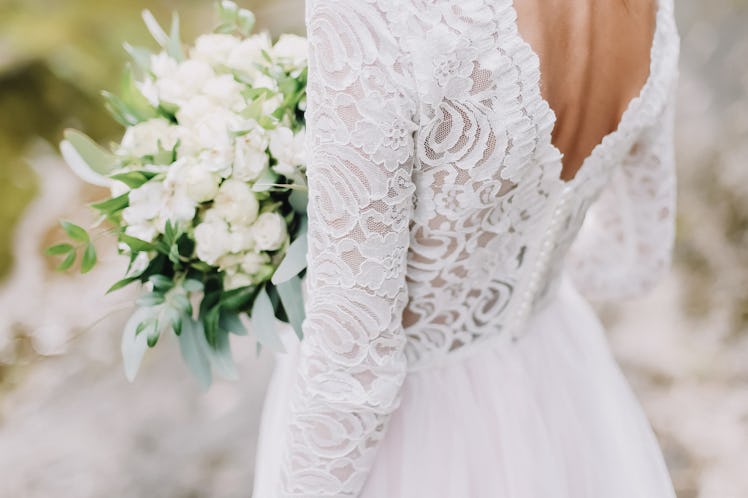
The Knot & Pinterest Will Limit Their Promotion Of Plantation Weddings
Pinterest and The Knot Worldwide will lessen the promotion of plantation weddings on their sites in an effort to discourage the support of venues that once housed slaves, according to a Dec. 4 report by BuzzFeed News. These changes are rolling out after two months of urging from Color of Change, a non-profit civil advocacy group. The new guidelines will limit plantation vendors’ ability to market their properties in a way that trivializes or masks their oppressive history.
A spokesperson for Pinterest tells Elite Daily that the platform is limiting the distribution of plantation wedding content site-wide, including autocomplete, search recommendations, and email notifications. When a user searches for plantation weddings, an advisory message will appear that the content may violate Pinterest’s policies. “Weddings should be a symbol of love and unity. Plantations represent none of those things,” the spokesperson says. “We are grateful to Color of Change for bringing attention to this disrespectful practice. We are working to limit the distribution of this content and accounts across our platform, and continue to not accept advertisements for them.”
Similarly, The Knot Worldwide is currently working to ensure wedding vendors aren’t referring to a history that includes slavery using language such as "elegant" or "charming." "Our goal is to ensure that the content of all of our vendors on our sites is respectful and considerate to everyone," a spokesperson for The Knot Worldwide tells Elite Daily. "We are in the process of reviewing all of our plantation venues and finalizing our guidelines. The use of language that romanticizes or glorifies a history that includes slavery will not be allowed."
This will apply to all venues, not just those marketed as plantations, to account for former plantations that might have changed their names to things like "manors" or "farms," The Knot's Chief Marketing Officer Dhanusha Sivajee told BuzzFeed. “We want to make sure we’re serving all our couples and that they don’t feel in any way discriminated against," she explained.
In the last decade, Google Trends data shows that searches for “plantation weddings” have been on a gradual decline. They spiked briefly in September 2012, around the time that Blake Lively and Ryan Reynolds got married at Boone Hall Plantation in South Carolina. (Boone Hall also served as a filming location for The Notebook in 2004, and searches for “plantation weddings” spiked in that following year). Famous historical sites like Monticello have changed their exhibits and tours in recent years to talk more openly about slavery.
According to Color of Change’s Vice President, Arisha Hatch, the wedding industry makes a profit by “promoting plantations as romantic places to marry, and in doing so, routinely denies the violent conditions black people faced under chattel slavery.” She tells Elite Daily that these places represent an extremely violent history for people of color. “Plantations are physical reminders of one of the most horrific human rights abuses the world has ever seen,” Hatch says. “The vast majority of the wedding industry’s marketing fails to recognize plantations as sacred spaces where the bodies of many black people’s ancestors are buried in unmarked graves to this day.” Instead, she explains, plantation venues use words like “charming,” “elegant,” and “sumptuous” to attract potential clients for weddings.
Hatch told BuzzFeed that Color of Change's goal is to shift public perception of plantations to be more realistic. “If we were talking about concentration camps, it would be weird and disrespectful and egregious for folks to be seeking to have their weddings at these locations,” she told BuzzFeed News. “We’re trying to elevate public awareness around the ways in which corporations can enable such disrespectful behavior.”
Color of Change has been pushing for wedding media brands to make changes since October 2019, when the group first reached out to Pinterest, The Knot, Zola, Martha Stewart Weddings, and Brides magazine to share their concerns about plantation weddings. Hatch told Buzzfeed News that the non-profit chose to contact wedding-planning platforms, rather than the venues themselves, since these media companies don't have financial stake in individual weddings — they simply highlight the venues as options for couples.
Pinterest and The Knot agreed to meet with Color of Change in November 2019 and implement changes, but Hatch says Color of Change has yet to hear back from Martha Stewart Weddings and Brides. Zola did not initially respond directly to Color of Change's request, but according to BuzzFeed News, the site removed several plantation venue references in previous blog posts. A representative for Zola tells Elite Daily, "We re-evaluated all our venues listed on Zola and determined we will not allow vendors to list who are plantations. We recognize that this is a painful issue and have been evaluating on an ongoing basis. We appreciate Color of Change for bringing this issue forward, and will work with them and additional organizations to ensure our policies and guidelines are inclusive and make everyone feel welcome."
These changes to Pinterest and The Knot may bring further attention to the controversy inherent in plantation properties, and prompt more dialogue about the history of some of these wedding venues. Prior to Zola's statement regarding the ongoing change, Hatch told Elite Daily, "The Knot Worldwide and Pinterest’s changes should be a signal for Zola, Brides, and Martha Stewart [Weddings] to do the right thing. It would be a great sign of social responsibility for these platforms to rectify how they feature plantations as wedding venues."
Editor's note: This article was updated to include a statement from a representative for Zola.
This article was originally published on